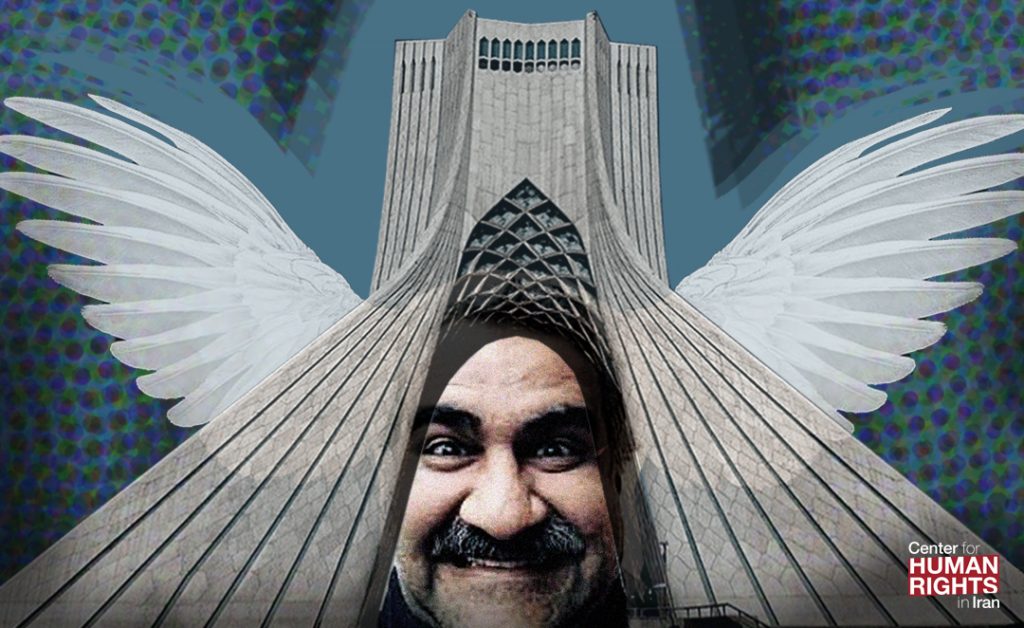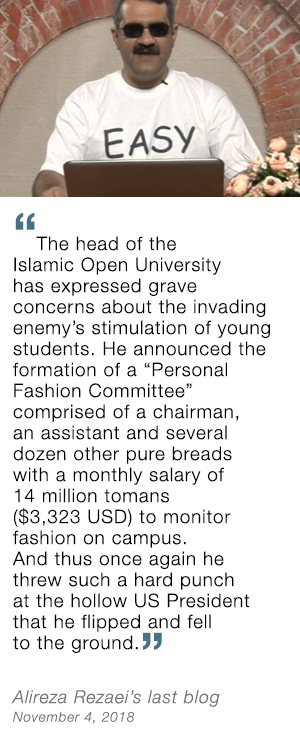Death of Satirist Alireza Rezaei in Exile Prompts Outpouring of Grief from Iranians Forced by State Repression to Flee Iran

Beloved Blogger Broke Taboos by Writing About Political and Social Issues with Humor
November 29, 2018—The death in exile of prominent Iranian satirist Alireza Rezaei has prompted an outpouring of grief by his compatriots inside and outside Iran, who lament not only his death but also the brutal personal cost of exile and the cruelty of a state that will not abide by freedom of expression.
“Rezaei had to leave Iran because of the power of his pen. This is the terrible price of political repression—people lose their homeland, and the homeland loses its greatest talents,” said Hadi Ghaemi, executive director of the Center for Human Rights in Iran (CHRI).
Rezaei, 43, died of a heart attack in Lille, France, on November 27, 2018—eight years after he left his birth country of Iran to escape persecution by the authorities. A masterful and beloved satirist, he used humor to expose the hypocrisy of religious and political figures in Iran through his writings.
Outpouring of Grief by Iranians Over the Bitterness of Exile
 The outpouring among Iranians around the world has been intense, as Rezaei’s death has brought into sharp relief the personal pain of those who have had to flee their homeland due to Iran’s political and cultural repression and its intolerance of peaceful dissent.
The outpouring among Iranians around the world has been intense, as Rezaei’s death has brought into sharp relief the personal pain of those who have had to flee their homeland due to Iran’s political and cultural repression and its intolerance of peaceful dissent.
“Damn you the Islamic Republic. Damn you for all the people who gave their in exile or the ones whose life you took inside the country. Damn you for all the dear lives lost. Damn you for Alireza Rezaei.”
Kambiz Ghafouri, a journalist, on Twitter
“He left [Iran] unwillingly. They forced him. When they didn’t let him live, speak and write freely, he gave in to forced migration. He told me to come, too. I laughed and said you’ll come back. He said our lives won’t last that long! They didn’t let him come back. He went and deeply touched our hearts.”
Hossein Ronaghi, former political prisoner in Iran, on Twitter
Many spoke of the permanent longing for a homeland that never leaves the exiled.
“My dear friend! I can’t hold back the tears. I will miss your kindness, sincerity, great spirit and gentle eyes. I know you would not have left us so soon if you could have gone back to your country.”
Saeed Bashirtash, a political activist, on Twitter
“We are all in shock from this sudden death. The hashtag for Alireza Rezaei’s wish to return to Iran [translates to, just take me to Iran] broke us into tears. It broke our heart. Although our heart had already broken when we turned and looked at Iran for the last time. We wish at least those in Iran are happy. We wish!”
Mehrdad Ghasemfar, journalist, on Twitter
Others expressed anger at the injustice of a system that forced their exile—a system that arrests those who will not conform to the state’s dictates regarding artistic expression, political views or personal beliefs, and punishes with years behind bars those who speak out in defense of these basic human rights and freedoms.
“This is the most invisible and cruel method of suppression: To crush people’s spirit in a place they don’t want to be. We are a people whose bodies don’t have the right to return to our place of birth.”
Saman Rasoulpour, a journalist, on Twitter
Also expressed was an awareness that the country too was a victim of the state’s tyranny, deprived of many of its most talented, creative and gifted people who fled with great reluctance a country they loved but which refused to allow them to speak, believe or create freely.
“Damn you for making talented people suffer in prison or get killed for their opinion or die with hopes of seeing their homeland again. All you have given our country is longing, Mr. Islamic Republic. Longing for freedom, longing for peace, longing for the homeland.”
Mahshid Samei, an Iranian citizen, on Twitter
 Some of the most anguished comments came from Iranians who spoke of the intense private pain and isolation that is a permanent partner of exile.
Some of the most anguished comments came from Iranians who spoke of the intense private pain and isolation that is a permanent partner of exile.
“(The exiled) live as strangers in strange lands and die more alone than ever…. We silence a thousand injustices in our throats and die over and over again every day. We become older than our age, more broken and lonely.”
Aghazadeh, an Iranian citizen, on Twitter
“Iranians don’t emigrate. At best they become displaced. Heartbroken. PS: Damn this world #Alireza_Rezaei.”
Hossein Dehbashi, a journalist, on Twitter
Not all of those expressing grief over Rezaei’s death necessarily agree with his political opinions. Still, they bemoaned a repressive system that would not tolerate his—or any divergent—views.
“We had a lot of difference with Alireza Rezaei during the elections. Other than his demise, what makes us even sadder is this question: Why should a young man have to emigrate for his rightful activities and die in a strange land?”
Reza Younesi, an Iranian citizen, on Twitter
“Thousands of Iranians carry a wound from being forced to leave their country because of their beliefs or identity. A wound that opens up here and there no matter how you try to cover it up or pretend it doesn’t exist.”
Tara Sepehri Far, a researcher at Human Rights Watch, on Twitter
Bitterness over the impossibility of return was frequently expressed. President Rouhani encouraged Iranians to return home when he assumed office in 2013, stating, “It is the natural right of every Iranian to visit his/her country. Do we have the right to deny Iranians the scent of their homeland?” Iran is also a signatory to the International Covenant on Civil and Political Rights (ICCPR), which in Article 4, states: No one shall be arbitrarily deprived of the right to enter his own country.
Yet activists, journalists, businessmen, environmentalists, and even politicians have been arrested upon their return to Iran. Rezaei’s fellow political satirist, Keyomars Marzban, was arrested by the Islamic Revolutionary Guard Corps (IRGC) shortly after coming back to Iran in September 2018 after being out of the country for several years—and remains detained to this day.
“Alireza Rezaei’s sad and painful fate could be the fate of several million Iranians who have been forced to leave their homeland for various reasons and cannot return until the Islamic Republic ends its stubbornness and obstinance.”
Najafi Tehrani, a Tehran-based cleric, on Twitter
“Iranians have a choice: remain silent, speak out and risk imprisonment, or live in exile. None of these are just or acceptable,” Ghaemi, CHRI’s executive director, said.
 For many exiled Iranians, Rezaei’s death brought home a terrible truth: that many will die before being able to return home to their families and their country.
For many exiled Iranians, Rezaei’s death brought home a terrible truth: that many will die before being able to return home to their families and their country.
“The last time I saw my mother and felt the scent of her embrace, she said: ‘Don’t you dare come back to Iran if God forbid something terrible happens to me or your father.’ I didn’t want to break her heart. I said to myself, what if something happens to us?”
Navid Ghazanfari, a TV producer in exile, on Twitter
“Many are rightly talking about the tragedy that fell on Alireza Rezaei away from his homeland, away from his family and the city he loved. I must say that the tragedy lies in the Islamic Republic’s determination to break up our ‘useless struggles.’ The death of people like Alireza Rezaei could be the fate of many of us residing in exile…”
Amirza Bijan, an Iranian citizen, on Twitter
Rezaei Forced to Flee after the Brutal State Crackdown in 2009
At the time of Rezaei’s departure from Iran in January 2010, many of his colleagues and friends were being arrested for protesting the disputed result of the 2009 presidential election, which brought then-president Mahmoud Ahmadinejad a second term. Rezaei had criticized the results on his popular blog. In a 2010 interview, he noted he was lucky not to be home when security agents came looking for him.
After leaving Iran, Rezaei wrote political satire for several media outlets and other organizations based outside Iran, such as VOA’s Parazit, Radio Farda’s Politik, RoozOnline and Tavana’s Magasal Show and performed satirical skits on his YouTube channel. In April 2017, Rezaei described himself on his blog as a non-partisan writer living in exile who used satire to bring about positive political change:
“I’m neither a reformist nor an anti-reformist. Generally, I’m not a leftist or a rightist or anything… I’m me, myself. I am who I am who I was, and hopefully who I will be. I say I ‘hope’ because I live abroad…. Rather than curse, I prefer to ‘critique’ my country’s president, members of Parliament and city counselors. In my profession, I prefer… to use new phrases to highlight their smallest mistakes as much as possible in order to play a role in correcting and improving them.”
Alireza Rezaei on personal blog April 4, 2017 on personal blog
Two years ago, a few months after being hospitalized for heart problems, Rezaei tweeted his wish to be returned to Iran after his death:
“When I die, take my body out the back door of the airport and throw it in God’s desert so that the animals can have a meal and be happy. Just take me to Iran.”
Alireza Rezaei, Tweet on July 9, 2016
It will never be known if the authorities in Iran would have allowed Rezaei’s body to be returned home and if so, whether the authorities would have departed from their usual practice of forbidding loved ones and supporters of critics of the state to visit the grave in mourning. Rezaei will be laid to rest in France.





